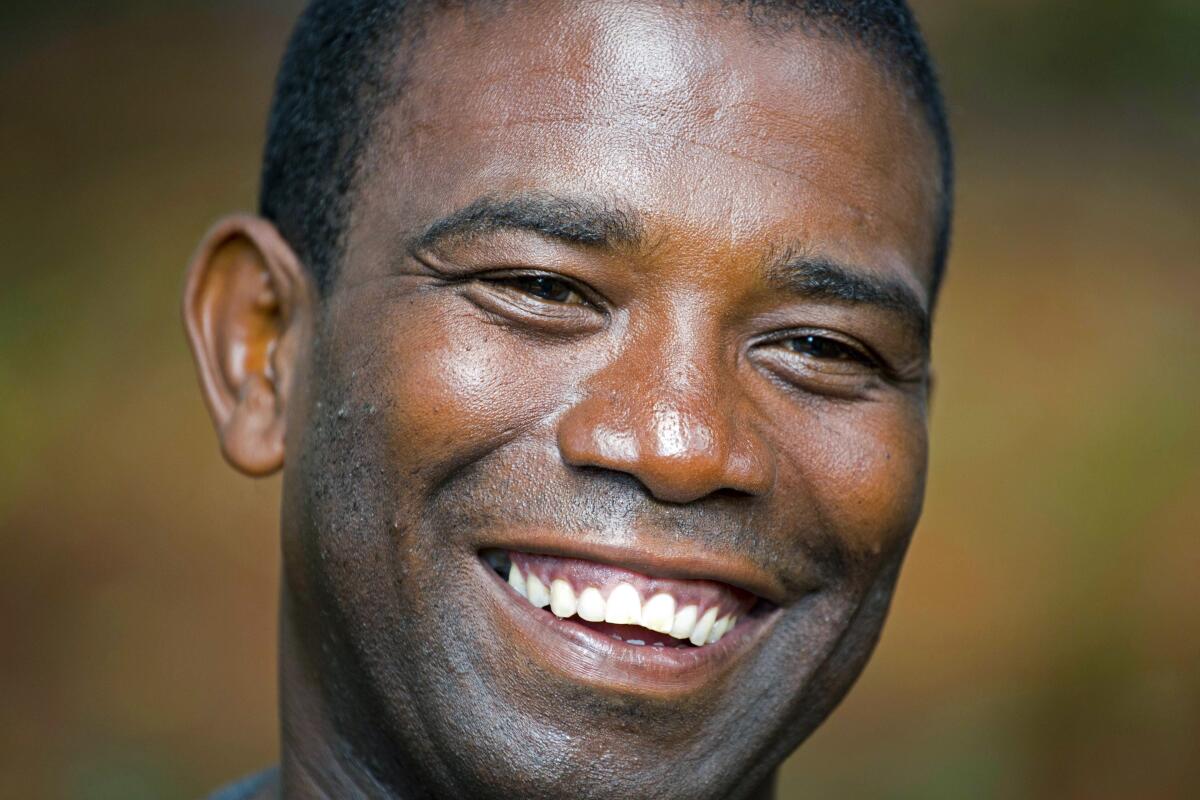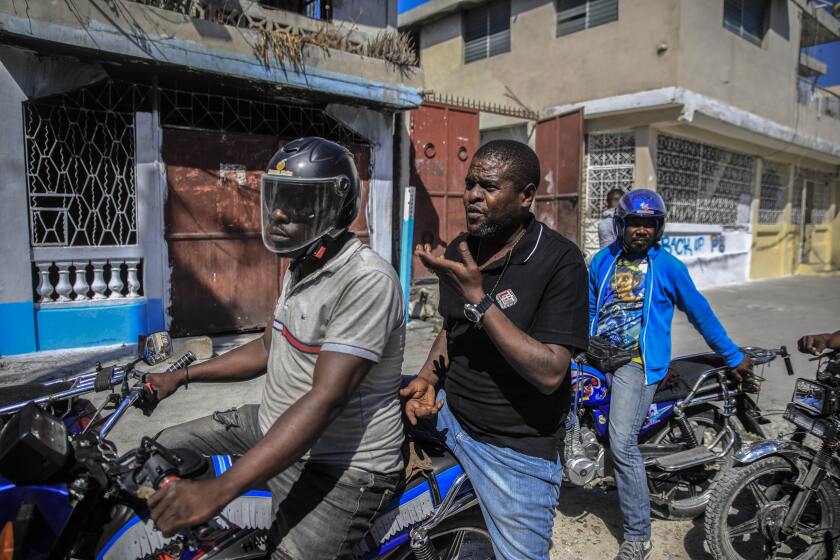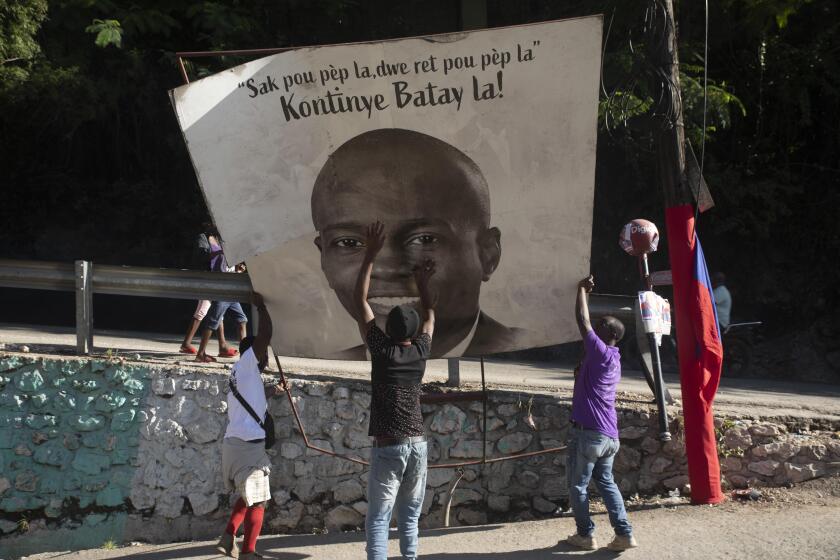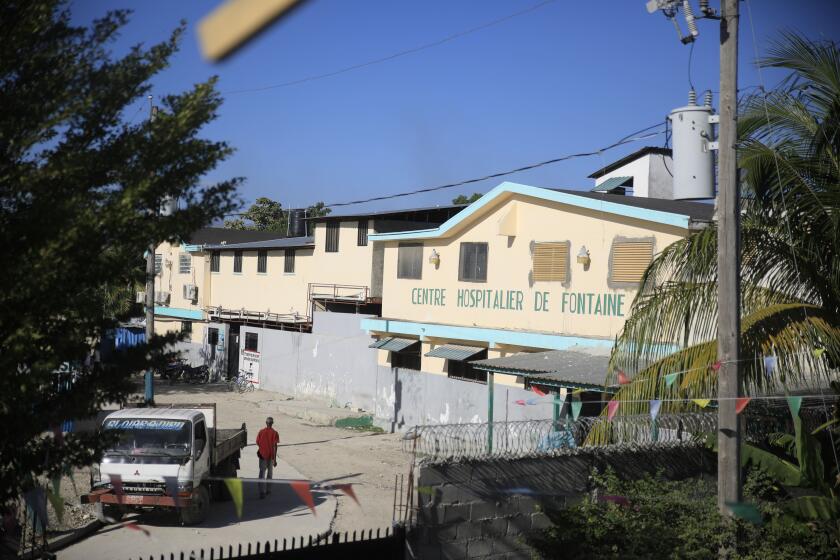Coup leader Guy Philippe repatriated to Haiti as many question his next role

- Share via
PORT-AU-PRINCE, Haiti — Notorious coup leader Guy Philippe returned to Haiti on Thursday after the U.S. government repatriated him, sparking concerns that his presence could unleash further upheaval in a country already reeling from gang violence and political instability.
It wasn’t clear what role, if any, Philippe expected to play upon his return to Haiti, which is under siege by gangs that grew extremely powerful in the political vacuum created by the July 2021 assassination of President Jovenel Moïse.
Philippe was a charismatic leader who was instrumental in the 2004 rebellion against former President Jean-Bertrand Aristide and had powerful ties to police, politicians and the business elite, said Robert Fatton, a Haitian politics expert and professor at the University of Virginia.
“Whether those kinds of ties will be revised, it’s not clear. What is very clear is that Guy Philippe has always seen himself as some sort of a messianic figure who should lead Haiti,” Fatton said.
Armed men such as ‘G9 Family and Allies’ gang leader Jimmy Cherizier are filling the power vacuum left by a crumbling government.
Philippe’s attorney, Jean Joseph Louicher, confirmed to the Associated Press that Philippe arrived in the capital of Port-au-Prince on Thursday morning.
“We’ve been fighting for four years to reduce the sentence of Guy Philippe to bring him home,” he said, referring to a money laundering charge he pleaded guilty to in the U.S.
Louicher said he was waiting for Philippe to be processed as required by protocol and released by Haiti’s National Police and migration officials “so he can go home safely to his family today.”
Philippe, who was dressed in a gray jumpsuit, was seen walking into Haiti’s National Police station after getting off a bus. He could not be immediately reached for comment.
Philippe once served as police chief for the northern coastal city of Cap-Haitien and was later accused of masterminding attacks on police stations and other targets while in exile in the Dominican Republic.
A year has passed since President Jovenel Moïse was assassinated at his private home.
He returned to Haiti in 2004 and led a band of rebels that captured Cap-Haitien as he joined an uprising that led to the ouster of President Jean-Bertrand Aristide.
Philippe was arrested in Haiti in January 2017 while participating in a live radio talk show. He had recently been elected to Haiti’s Senate, and authorities whisked him quickly to the airport to avoid potential riots protesting his extradition to the U.S.
The former rebel leader was nabbed after years of successfully eluding arrest and failed raids on his remote home in Haiti’s western coastal region that involved U.S. Drug Enforcement Administration agents and helicopters.
In a 2016 interview with the Associated Press at his stronghold in Pestel, Philippe said he was innocent of any crimes and that he would fight any law enforcement that tried to capture him.
After his 2017 arrest, Philippe appeared before a federal judge in Miami to face decade-old U.S. drug charges including cocaine trafficking conspiracy and money laundering.
A hospital director in Haiti says police in armored trucks evacuated patients and children trapped inside a hospital by gangs who surrounded the facility.
In June 2017, he was sentenced to nine years in prison after pleading guilty to a money laundering charge.
Authorities said that Philippe, a former high-ranking official with the National Police, had used his position to provide protection for drug shipments in exchange for cash. Officials said he acknowledged receiving up to $3.5 million in bribes.
Fatton, the professor, noted that Philippe has given interviews in recent years in which he “very clearly said he intends to go back to Haiti and be involved in Haiti, and even much more than he used to be.”
Fatton said that while he expects Philippe to play a role in Haitian politics, there is a lot of uncertainty regarding his future as many Haitians question why the U.S. chose to repatriate him “when you have a rather explosive situation in the country.”
It’s also unclear whether Philippe might have any connections with former police officials who became powerful gang leaders, including Jimmy Chérizier, best known as “Barbecue.”
The multinational force’s main mission will be to help combat violent gangs engaged in killings and kidnappings in the troubled country.
Philippe was released from prison in the U.S. on Sept. 7, according to court documents. In the weeks that followed, Haitians in and near his former stronghold organized protests, blocked roads and demanded that the government provide Philippe travel documents so he could return to his native country.
Philippe’s supporters also include former Haitian President Michel Martelly, who is still considered a powerful, behind-the-scenes political player.
On Thursday, about a dozen supporters wearing T-shirts that read “Guy Philippe” on the front and “Let’s put our hands together to save Haiti” crowded around the entrance of Haiti’s main international airport to get a glimpse of the former rebel leader. None of them wanted to give their names, but they said Philippe should be allowed to participate in upcoming general elections that have been repeatedly delayed. A date has not been set.
“One would have to wait and see what his return means, if anything at all,” Alex Dupuy, a Haiti-born sociologist and former professor at Wesleyan University in Middletown, Conn., said in an interview. “He’s not going to be necessarily the principal actor in the drama that’s going on in Haiti and the awful political situation.”
Sanon reported from Port-Au-Prince and Coto reported from San Juan, Puerto Rico. Associated Press videographer Pierre-Richard Luxama in Port-au-Prince and AP reporters Eric Tucker and Rebecca Santana in Washington contributed to this report.
More to Read
Sign up for Essential California
The most important California stories and recommendations in your inbox every morning.
You may occasionally receive promotional content from the Los Angeles Times.

















